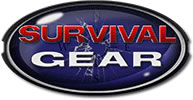Bug Out Bag for Baby
Many parents already carry a diaper bag with them containing the basic necessities for an infant or young child. Various small bags shaped like oversize purses are available from mass market merchants such as Target, Wal-Mart, and Kmart. Unfortunately, most of these bags are not intended to stand up to heavy use or larger loads. Fortunately companies such as Maxpedition, 5.11 Tactical gear, Blackhawk, and others offer a variety of bags designed for military medics or otherwise "rough use" which could also be used. However for a vehicle or a day trip, even one of the smaller and less durable commercial bags will do. Just don't expect them to survive days on a rough trail. However simply having all the necessities in one place will go a long ways towards making life on the road more bearable with an infant.
Bug Out Bag for Your Baby
The first place to start is with making sure that there is an adequate supply of food. Even if a baby is normally breast fed, it is a good idea to have a supply of instant baby formula on hand. Stress or injury can reduce the flow of breast milk, and there is always a chance of potential serious injury (or even death) to the mother resulting in someone else having to feed an infant. Formula can be had either in liquid form already in bottles or cans which needs no water added, powders which need water, or condensed cans. Some of the ready to feed cans contain only a single feeding of four to six ounces, while other larger cans (which require a can opener or church key to access) will hold as much as a quart. Several companies also offer ready to feed formulas in resealable plastic bottles.
Which one to buy will depend on how much the baby is expected to eat as well as the family budget and whether or not someone will have to carry the bag as opposed to transporting it via vehicle. The single feed premixed cans are useful in many ways as they require no additional water and are ready to go. (There are also glass bottles filled with the same, which just need a nipple added, but these are more prone to breakage, and plastic bottles which just need a nipple which do not break and are somewhat lighter). The problem with these is that they tend to be very expensive on a per feeding basis and it is quite heavy to carry a large supply if one is relying on muscle power.
The larger bottles of ready mix do not offer the advantage that many people presume that they do. The contents need to be refrigerated after opening; otherwise they can rather quickly spoil. In many emergencies, adequate refrigeration simply will not be available. The larger cans will also need a separate container handy to pour their contents into as there is no way to reseal them.
The cans of concentrate are bulky and heavy and would require a clean water source. Perhaps the best compromise if one is worried about weight is to carry two of the smaller 12.9 ounce cans of instant powdered formula. Why two of these instead of one of the larger 26ounce cans? Simple - if the formula in the can should somehow get wet, or the can itself damaged, it is better to lose half of one's supply rather than all of it. This will also provide two measuring scoop dippers rather than just one. This should last around three days (or more) for all but the most voracious eaters. However each baby will vary, so pay attention to yours. You will need a supply of clean water or a non iodine based water purification source (and container) to mix the formula with.
You will also need a supply of clean bottles and/or a way to wash/sterilize bottles. Many baby books claim that an infant can survive on formula alone up through the first year of life, however many parents prefer to feed their child solid foods. Gerber offers a line of "Graduates" meals that amount to almost mini MREs on trays. These can be an option for some older children. Otherwise Gerber offers infant foods in single serve plastic containers which will save considerable weight versus glass jars. Don't forget to bring some spoons.
One should also of course bring along enough diapers to last at least three days. Baby wipes are nice to have, but a roll of toilet paper will often work well. Some pre soaped wash cloths from the baby aisle and more wet wipes can help with cleaning.
Add any medications needed for the baby (that the doctor prescribes) and perhaps some baby Tylenol if you are comfortable using it or the baby's doctor says this is okay. A portable thermometer, nail clipper, baby brush, tooth brush, and suction bulb are also good to have, as well as any topical ointments that one might like for diaper rash or minor skin conditions.
Finally, don't forget to include small comfort items such as a plush animal, small baby book, and small self contained baby toy.
With these items on hand, an unexpected departure from home can be much more bearable with children along.
-Christopher Fisher
Comments
Customer reviews
No posts found
